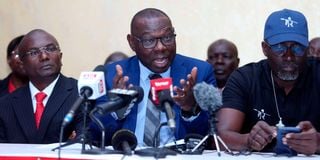Ex-Kenya player ‘Kempes’ Owino sues Fifa at CAS

Former Kenya international Sammy 'Kempes' Owino speaks to the media flanked by Andrew Amukoa (left) and former FKF vice president Sammy Shollei on September 7, 2024 in Nairobi.
What you need to know:
- Owino argued that this was the only way that FKF election would not attract litigation.
- If elected the FKF president, Owino said he would turn around Kenya’s ailing football.
Former Kenya international Samuel 'Kempes' Owino has filed a case before the Court of Arbitration for Sports (CAS) in Lausanne, Switzerland praying to the court to compel Fifa to form a Normalisation Committee in the country to conduct the federation’s elections.
Addressing the media on Saturday at Panari Hotel in Nairobi, Owino argued that this was the only way that the election would not attract litigation.
He filed the case at CAS through advocate Charles Ouma on Tuesday.
“The only sensible path forward to normalising the state of football is the institution of a Normalisation Committee by Fifa,” said Owino, who played for Harambee Stars and Gor Mahia in the 1970s and 1980s.
“This path will immunise the current election process against actual and possible judicial challenges. These challenges are inevitable given the current football situation regardless of who wins the upcoming elections,” he added.
Owino, who has publicly declared his interest in vying for the FKF top seat, was flanked by several football stakeholders, including his running mate Andrew Amukowa, former FKF vice president Sammy Sholei, and former Harambee Stars coach Jacob 'Ghost' Mulee.
Owino in particular took issue with the amendments that were made in the 2019/2020 Electoral Code during the FKF Special General Meeting (SGM) on August 24.
The former Gor Mahia and Luo Union player, who announced his bid for the FKF’s presidency on October 24 last year, said the changes will lock out many candidates thus attracting litigations.
“The path initiated by FKF through the just concluded Special General Meeting (SGM), will not result in free, fair, and credible elections. Instead, it will lock out qualified individuals and clubs from participating despite the electoral code changes that were made. It will also result in continued litigation,” said Owino.
“To the contrary, the Normalization Committee path we are fighting for, will result in free, fair, and credible elections that will be open to qualified candidates and clubs, and a football future free of litigation,” he added.
Seven county football association have gone to court seeking a stay of the resolutions passed in the FKF SGM.
Part of the electoral code says that one is eligible to vie if they have been involved in active football for two of the last five years.
Owino’s eligibility has come under question since he has been based in the US where he runs his AYSES football in Texas.
But he insisted he was qualified to run for the top seat.
“I was born in Kenya. I am a Kenyan citizen, and I played for Luo Union, Gor Mahia and Harambee Stars. I’m qualified if not more qualified than any candidate out there.”
If elected the FKF president, Owino said he would turn around Kenya’s ailing football by ensuring accountability, setting up development structures, and creating a good relationship with the Sports Ministry, schools, and grassroots football organisers.
“I have watched him and followed his story. He is a technician and then an administrator. I have followed the way he runs his business, he is not coming here to look for our money but to pump money into Kenyan football,” said Mulee.
Article 34 of the FKF constitution says that “decision passed by the General Assembly shall come into effect 60 days after the close of the General Assembly, unless otherwise stipulated in the present constitution or unless the General Assembly fixes another date for the decision to take effect.”





